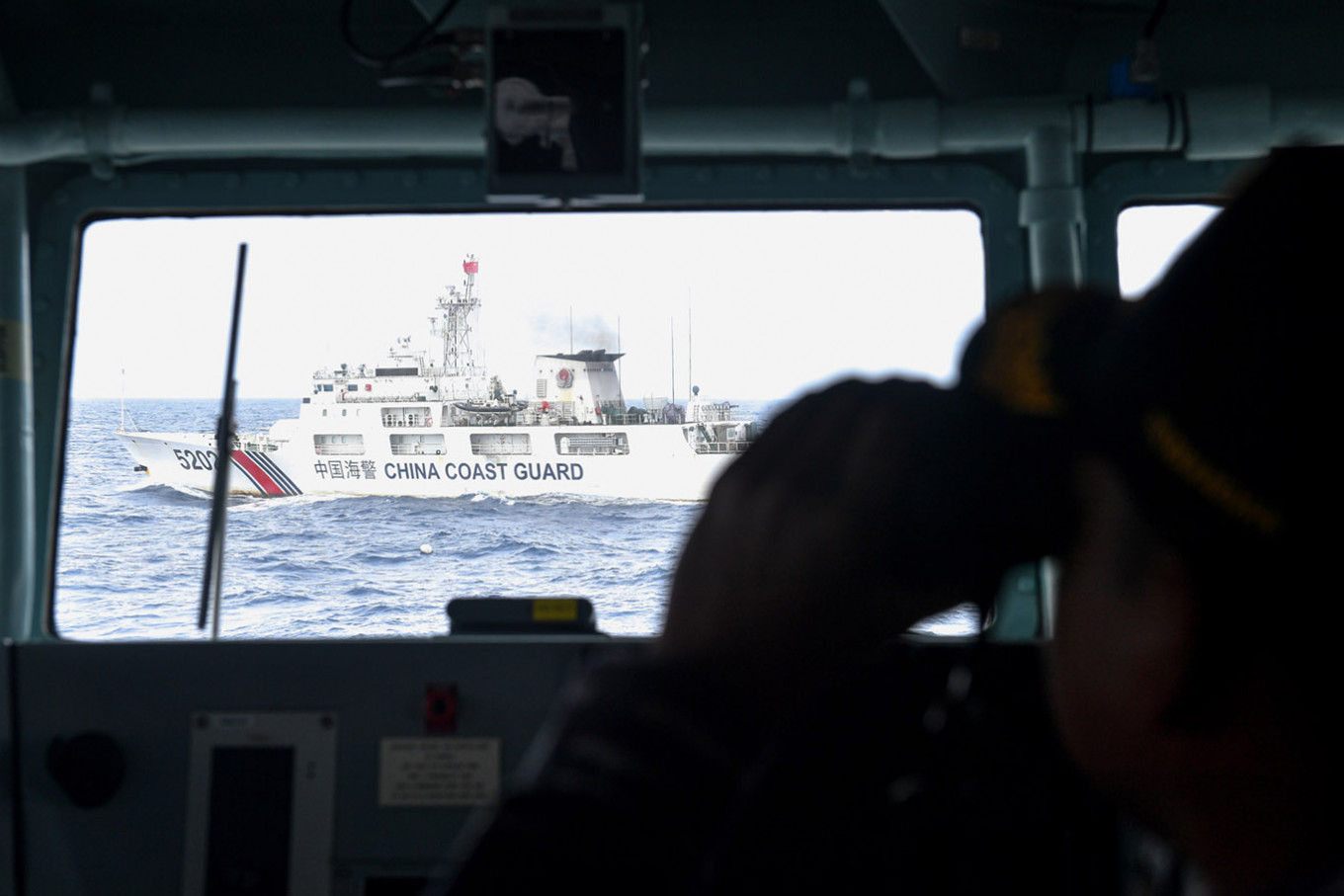Popular Reads
Top Results
Can't find what you're looking for?
View all search resultsPopular Reads
Top Results
Can't find what you're looking for?
View all search resultsProtecting our sovereign rights in North Natuna Sea
Change text size
Gift Premium Articles
to Anyone
P
ublic discourse on the North Natuna Sea has been full of argument. Condemnations are addressed over the recurring presence of Chinese fishing vessels that harvest fish in the North Natuna Sea with protection from their country’s coast guard.
Nothing new has come from the recent incidents except a tougher diplomatic response and provoking publications. China’s obduracy was reflected in a statement from China’s Foreign Ministry spokesman, who said “whether Indonesia accepts it or not, it cannot change the objective fact that China has rights and interests in relevant sea areas”.
Another statement, from a Chinese scholar and published in Global Times on Jan. 22, followed: “It should not be overlooked that China’s Coast Guard vessels are the most powerful among their kind […] It could lead to severe consequences and even result in a crossfire if Indonesia wants to oust China’s Coast Guard and fishing vessels by force.”
China’s unacceptable attitude toward international law can be observed as either a multilateral or bilateral issue.
The first point of view suggests that countries around the South China Sea region, including Indonesia, push forward the establishment of a regional fisheries management organization that covers the high seas in the South China Sea at the very least.
Bilaterally, Indonesia is in a strong position to face China due to United Nations Convention on the Law of the Sea (UNCLOS) provisions and the award of the Permanent Court of Arbitration (PCA) in 2016.
Five considerations in the PCA award are noteworthy in this regard. First, it states that the “nine-dash-line” is incompatible with the UNCLOS (paragraph 261).
Second, upon China’s accession to the UNCLOS, any historic rights that China may have had within the “nine-dash line” were superseded (paragraph 262). Third, fishing in the high seas is a right belonging to all states under the freedom of the high seas, and therefore China cannot exclusively claim it (paragraphs 269 and 270).
Fourth, a state that claims historic right is under the obligation to provide evidence that it has: (i) continuously enjoyed such right since ancient times; (ii) consistently prohibits other states from enjoying such a right and (iii) acquiescence from states are in place. In this regard, China was unable to do so (paragraphs 270 and 275). Finally, by ratifying the UNCLOS, China has relinquished the freedoms of the high seas that it had previously utilized (paragraph 271).
The idea of invoking UNCLOS articles 62 and 51 concerning access to the surplus of total allowable catch and on traditional fishing rights respectively, in the case of North Natuna Sea, is baseless. It should be noted that the UNCLOS prioritizes land-locked states and/or geographically disadvantaged states in receiving access to surpluses of the total allowable catch.
Moreover, the UNCLOS recognizes that traditional fishing rights are exclusive for the immediately adjacent neighboring state. China does not fall under the aforementioned categories of states. Consequently, there is absolutely no basis for China to fish in the North Natuna Sea.
Despite the aforementioned legal clarity, the Indonesian government ought to be more cautious of the future challenges it may encounter. The North Natuna Sea is only one of four susceptible Indonesian exclusive economic zones (EEZs). Incidents may also occur in Indonesian fishery management zones 716 (north of Sulawesi), 717 (north of Papua) and 718 (south of Papua).
Hence, equal efforts and attention should also be given to protect these areas, on top of the North Natuna Sea.
It is crucial for Jakarta to ensure that hundreds of thousands of fisherpeople are evenly distributed in these four zones up until the 200 nautical mile line.
Given the fact that small fishing vessels account for more than 90 percent of the total number of Indonesian fishing vessels, a modernization strategy has to be developed and immediately executed.
This could start from fixing the registry of Indonesian fishing vessels, which have been poorly maintained since the enactment of the 2014 Regional Government Law.
This may be followed with intensive empowerment, for instance by establishing small-scale enterprises equipped with bigger fishing vessels. Satellite monitoring has found that most fishermen operating in the North Natuna Sea are locals who manage only small vessels.
The government can help them, as well as other fishermen from other parts of the country, through the establishment of more integrated fisheries and maritime centers where fishermen can buy fuels, enjoy cold storage facilities and find vessel and fishing spare parts and fish markets.
Other incentives like waivers or the reduction of fish product retribution will also be helpful.
Pushing farther fishing operations and ensuring their sustainability is certainly costly. This initiative would require the government to direct enough economic incentives to create profitable seafood markets so as to attract the fishers to continuously fish in the frontiers of Indonesian EEZs.
In terms of surveillance, the government should build a grand design of minimum essential force capable of guarding the outermost lines of Indonesian EEZs. Coordinated asset deployments by the Indonesian Navy, Maritime Security Agency (Bakamla) and Maritime Affairs and Fisheries Ministry have to be conducted regularly and supported by adequate airborne surveillance, as well as robust information from detection technologies.
Other than protecting our sovereign rights in the EEZs, these agencies are also under the duty to protect and defend all Indonesian fishermen during their operation.
All factors are in favor of Indonesia. We have the sovereign rights over the abundant living resources in our seas, a huge population of fishermen, emerging markets and well-equipped government agencies. There is nothing that would withhold us from prospering in our seas.
__________
Cofounders of Indonesia Ocean Justice Initiative










